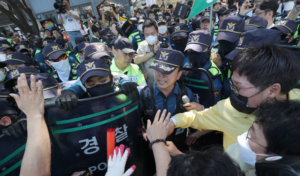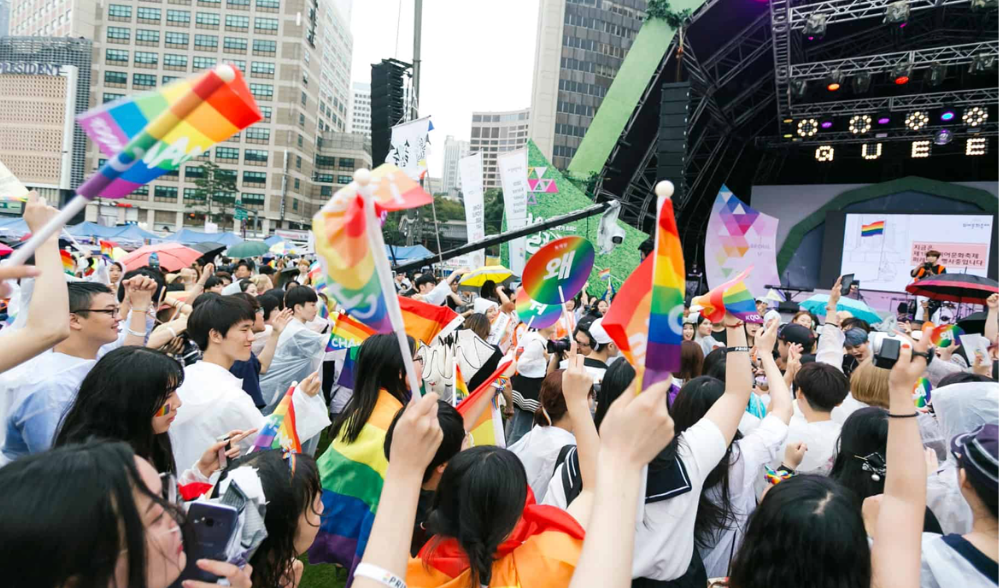ANYA CHINAPPI WRITES – On June 17 police and city officials in Daegu, South Korea, clashed with supporters of LGBTQ rights just hours before the scheduled start of the 15th annual Daegu Queer Culture Festival.
Tensions ran high as hundreds of local city officials and workers, backed by Daegu’s mayor Hong Joon-pyo, gathered to protest if not altogether halt festival organizers from entering the site in the district of Dongseongno. The South Korean news agency Yonhap estimates that around 1,500 police officers and 500 city officials were at the scene.
According to BBC News, Hong led church leaders and business owners to file an injunction with the courts in order to ban the festival on the grounds that large crowds would restrict access to local businesses in the area. The Daegu District Courts denied the injunction, stating that “the business risks cited by the plaintiffs are ambiguous and the freedom of expression is as important as the freedom of business.”
Still, Hong continued to express contempt for the festival on social media by posting his support for the Daegu Christian General Association’s court petition on Twitter. In the same post, he wrote that the festival would “instill a wrong sexual culture in the youth and the rights of sexual minorities are important, but the rights of the majority are equally important.”
Hong has long held a hard anti-LGBTQ stance. He ran twice for president and was formerly president of the defunct, highly conservative Liberty Korea Party. Moreover, in a televised debate, Hong claimed that “AIDS is rampant in Korea due to homosexuality and homosexuality is weakening the Korean military.”
 After a thirty- minute standoff at the festival, Hong held an emergency press conference, asserting that festival organizers had “illegally occupied the roads.” He also said on social media that he was going to hold the chief of the Daegu police agency responsible for “injuring our public officials for the sake of the queer festival.”
After a thirty- minute standoff at the festival, Hong held an emergency press conference, asserting that festival organizers had “illegally occupied the roads.” He also said on social media that he was going to hold the chief of the Daegu police agency responsible for “injuring our public officials for the sake of the queer festival.”
Despite threats from Hong, the police continued to protect festival organizers and attendees on the grounds that, according to Yonhap, the agency determined that “even if a rally does not obtain a permit for occupying roads, it can be recognized as justified within the scope of the criminal and administrative laws.” The police agency responded to the mayor by reiterating that the festival was a legal assembly and its members were simply carrying out their duty to provide protection. The force also advised the mayor to “stop rambling.”
Unfortunately, such opposition to government from local law enforcement is highly uncommon in South Korea.
Historically, South Korea has a very strong conservative Christian culture that has long opposed the LGBTQ community. While the country does not have federal laws regarding LGBTQ citizens, cities have enacted their own restrictive and discriminatory rules. South Korea is far less progressive and accepting of LGBTQ culture than surrounding democratic countries such as Japan and Taiwan.
Yet the push towards accepting the LGBTQ community seems to be making progress. February 2023 marked the first time South Korean courts recognized the rights of same sex couples by allowing them benefits equal to those of opposite-sex couples.
Just where do the rights of the LGBTQ community in South Korea stand now? The festival has been held in the city since 2009, with similar protests occurring in prior years. Yet as the courts continue to support this festival, South Korea may well be progressing to a more open society. Nevertheless, it will have a long way to go to catch up not just with Japan and Taiwan…but with other countries around the world.
LinkedIn – www.linkedin.com/in/anyachinappi


interesting information to read, visit Tel U